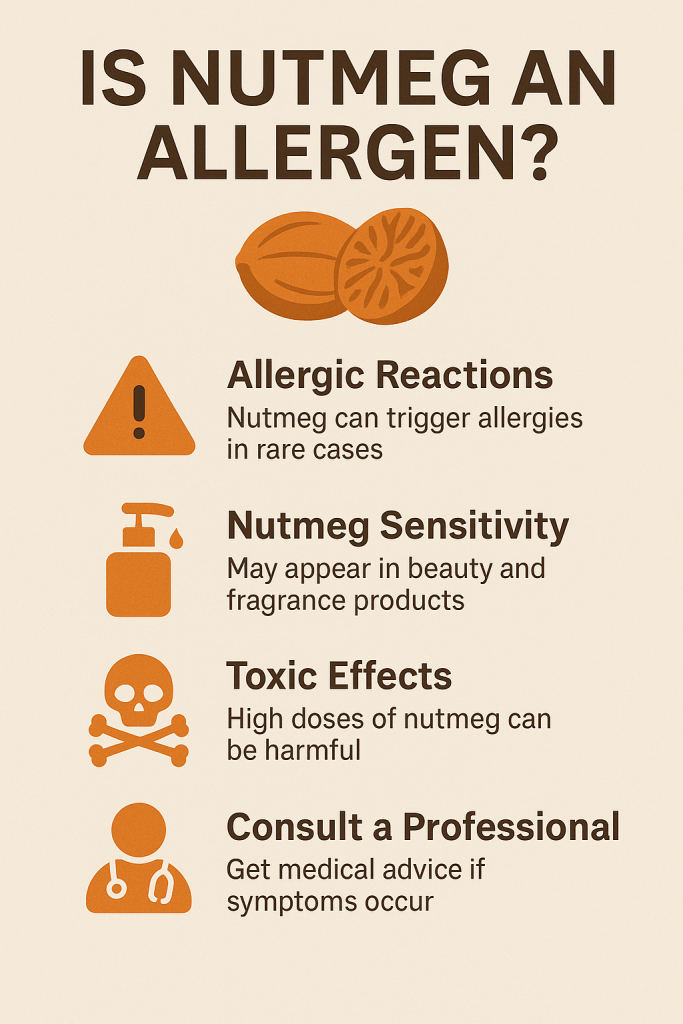⚠️ Is Nutmeg an Allergen? Hidden Dangers in a Common Spice
You’ll find nutmeg in everything from festive drinks to hearty stews. It’s a kitchen staple for many, yet few stop to ask — is nutmeg an allergen? That’s where things get tricky. This everyday spice might be more reactive than most people think — and in some cases, downright dangerous.
In this Health Busters post, we’re uncovering the truth behind nutmeg. You’ll learn how it affects the body, whether it can cause allergic reactions, and why even a little too much could spell trouble.
🌰 What Exactly Is Nutmeg?
Nutmeg comes from the seed nestled inside the fruit of Myristica fragrans, a tropical tree mainly cultivated in Southeast Asia and the West Indies.
After harvesting, the seed is separated from its outer coating, dried, and then finely ground into the fragrant spice commonly used in cooking.
It’s often praised for its sweet, earthy fragrance, but it also contains natural chemicals that may trigger reactions in sensitive individuals.
One of those compounds, myristicin, can impact the nervous system. When used sparingly, it’s generally tolerated without issue. But larger amounts have a very different effect, especially if you’re wondering is nutmeg an allergen in your case.
🚨 Is Nutmeg an Allergen or a Hidden Trigger?
Although it’s not one of the most common allergens, there have been documented cases of people reacting adversely to nutmeg.
Nutmeg has triggered allergic reactions in both adults and children. Although rare, nutmeg allergies do exist. Symptoms may include:
-
Sneezing or nasal congestion
-
Hives, itching, or skin rash
-
Stomach cramps
-
Swollen lips or tongue
-
Shortness of breath in extreme cases
This happens because some people’s immune systems treat nutmeg proteins as harmful. So when asking “is nutmeg an allergen?” the science studies confirms it can be — even in small amounts.
🧴 Nutmeg Sensitivity: Non-Allergic Reactions Still Matter
Even if you’re not technically allergic, nutmeg might still cause problems. Those with IBS, eczema, or asthma may notice reactions. This is especially true when nutmeg appears in unexpected places — such as cosmetics or air fresheners.
You’ll also find nutmeg derivatives in beauty products, fragrance sprays, or wellness oils — all of which can irritate people with chemical sensitivities.
So, is nutmeg an allergen in your daily routine? For sensitive individuals, checking non-food labels is just as important as watching what’s on your plate.
☠️ Can Nutmeg Be Toxic to Humans?
Here’s where things get serious. Eating more than a teaspoon of nutmeg in one sitting may lead to dangerous side effects for some people.
Research links myristicin, one of nutmeg’s key compounds, to adverse effects on both the body and mind. These may include:
-
Nausea and vomiting
-
Dizziness or confusion
-
Hallucinations
-
Rapid heart rate
-
In rare cases, seizures or collapse
Toxicity symptoms usually begin 3–8 hours after ingestion. For certain individuals, these effects may continue into the next day and disrupt sleep or digestion.
Cases like these are usually the result of intentional misuse, where individuals consume nutmeg in excess hoping to experience mind-altering effects — a risky decision that often backfires.
🛒 Is Nutmeg an Allergen in Processed Products?
You may not realise how often nutmeg shows up in packaged goods. It’s commonly used in:
-
Baked goods and spice blends
-
Ready meals
-
Condiments
-
Dairy-based desserts
-
Herbal teas
For allergy-sensitive individuals, this can be a minefield. That’s why reading ingredients on processed products is a habit worth forming.
So again, is nutmeg an allergen in your food? For some, absolutely — even trace amounts can cause a reaction.
🧠 Should You Avoid Nutmeg if You’re Sensitive?
If you have known spice sensitivities or unexplained skin or gut issues, consider removing nutmeg from your diet and products for a few weeks.
Keep a note of any changes during this time, especially improvements in digestion, mood, or skin condition.
Likewise, if you’re using nutmeg topically or inhaling it via diffusers, watch for subtle changes like tingling, tightness, or light rashes — these may be early signs of intolerance.
You don’t have to break out in hives to know something’s off — sometimes, the signs are much more subtle but still worth noting.
When in doubt, speak to a qualified health practitioner. Ask them directly: is nutmeg an allergen in my case, and should I avoid it?
✅ Final Thoughts: Is Nutmeg an Allergen You Should Worry About?
Is nutmeg an allergen? It’s certainly a possibility. If you’re someone who reacts to aromatic foods or fragrances, it’s wise to treat nutmeg with extra caution.
If you’ve had reactions to aromatic spices like allspice, mace, or cinnamon, there’s a chance nutmeg might bother you too.
It’s always wise to listen to your body. Reduce your exposure if you’re unsure, and don’t hesitate to consult a healthcare professional if something feels off.
As always we hope you found the article interesting and just raised your awareness to the potential hazards of this seemingly tasty spice that can be found on lots of supermarket shelves. Here are a couple of articles you might find helpful:






